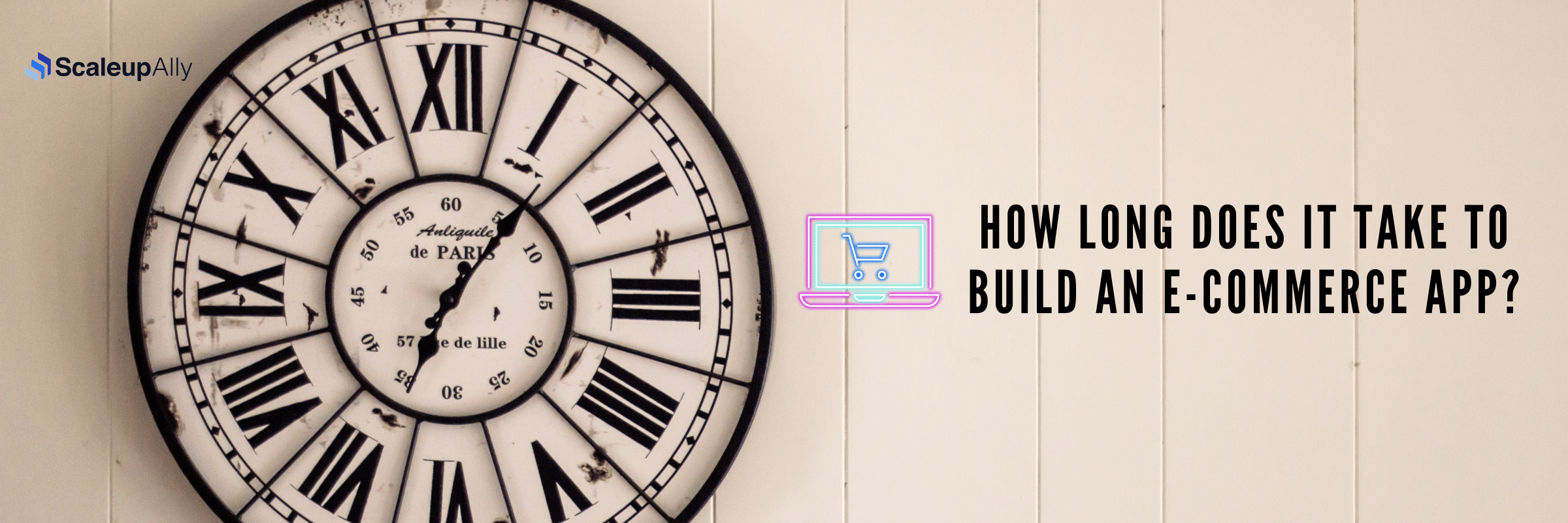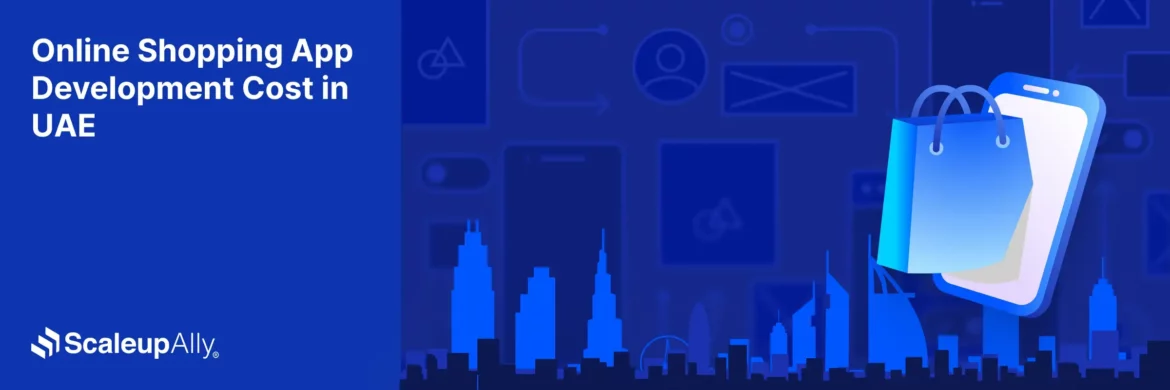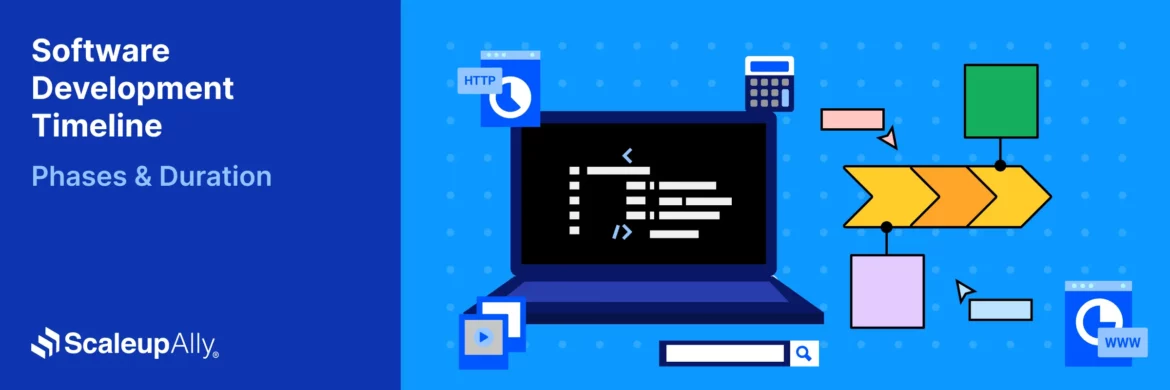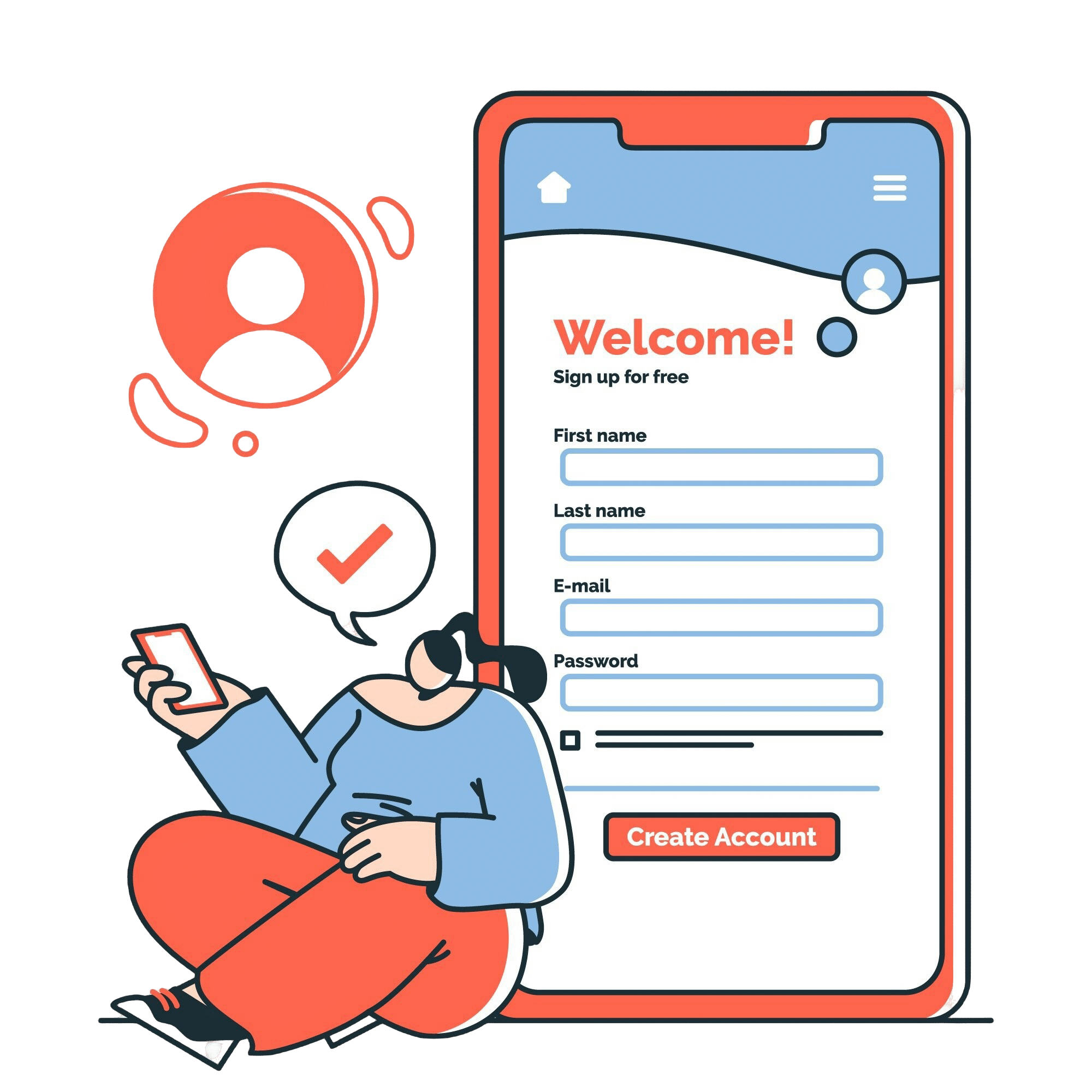
How Long Does It Take To Build An E-commerce App?
Manu Jain | July 7, 2024 , 14 min read
Table Of Content
Are you eager to establish or enhance your online presence as an ecommerce entrepreneur? If so, you’re likely looking to build an ecommerce app.
Crafting the perfect ecommerce app doesn’t happen overnight; it’s a journey influenced by various factors such as app complexity, included features, target platforms, and the proficiency of your development team.
In this article, we’ll break down these factors and provide you with an understanding of the average development time for different types of ecommerce apps.
We’ll also share some tips for speeding up the development process.
Let’s dive right in!
Key Takeaways
- Development Timeline: Building an e-commerce app takes 3-18 months, depending on complexity—basic apps (3-6 months), intermediate apps (6-9 months), and advanced apps (9-18 months).
- Key Factors Influencing Time: Complexity, feature set, platform choice, team expertise, team size, and thorough testing are critical in determining the timeline.
- Platform and Features: Developing cross-platform apps (e.g., React Native) is faster than native apps. Adding advanced features like multi-gateway payments, analytics, or multilingual support increases development time.
- Team Impact: Larger, experienced teams complete projects faster, while detailed UI/UX designs and iterative feedback cycles may extend timelines.
- Time-Saving Strategies: Using pre-built platforms (e.g., Shopify, WooCommerce), outsourcing to specialized vendors, and adopting Agile methodologies can significantly speed up development.
Overview in Brief: Time To Build E-Commerce App
- Overview in Brief: Time To Build E-Commerce App
- Factors that Affect the Development Time of an E-commerce App
- Average Development Time for Different Types of E-commerce Apps
- Tips for Speeding up the Development Time of Your E-commerce App
- Conclusion: How to Choose the Right Development Timeline for Your E-commerce App
- Real-Life Use Case: Scaling Up an E-commerce App with ScaleupAlly
- Frequently Asked Questions
- Other Articles Around Mobile App Development Timelines
It takes around 1200 hours (15 weeks) to build an e-commerce app. However, a basic e-commerce app can be built in 800 hours, while a more advanced app may require up to 2000 hours. The accurate timeline depends on your specific requirements.
Factors that Affect the Development Time of an E-commerce App
1. Complexity of the App
The complexity of an ecommerce app has a significant impact on the development time. A basic ecommerce app with standard features like product listings, shopping carts, checkout, and user registration can typically be developed within 3-4 months. On the other hand, an advanced ecommerce app with extensive customization, third-party integrations, real-time analytics, multilingual support, and advanced security features can take anywhere from 8-12 months to develop. It’s important to carefully consider the complexity of your app and prioritise the features that are essential for your business.
2. Features Included in the App
The features you want to include in your ecommerce app will also affect the development time. If you’re looking to build a basic app with minimal features, the development time will be shorter. However, if you want to incorporate additional functionalities like customer accounts, wish lists, product reviews, advanced search capabilities, and support for multiple payment gateways, the development time will naturally be longer.
It’s crucial to define the must-have features for your app and consider the impact of additional features on the overall development timeline.
3. Platform(s) the App Will be Developed for
Deciding which platform(s) to develop your ecommerce app for can impact the development time as well. If you choose to develop separate native apps for iOS and Android, it will take more time compared to developing a cross-platform app that can run on both platforms using technologies like React Native or Flutter.
The choice of platform(s) should be based on your target audience and business requirements. Developing for multiple platforms will require additional effort and time, so it’s essential to weigh the benefits and drawbacks before making a decision.
4. Development Team’s Experience and Expertise
The experience and expertise of the development team are crucial factors in determining the development time of an ecommerce app. A skilled and experienced team will be able to efficiently navigate the development process, effectively handle challenges, and deliver high-quality results in a shorter duration.
On the other hand, a less experienced team may take longer to complete the project and may encounter more obstacles along the way. It’s important to choose a development team with a proven track record and expertise in ecommerce app development to ensure a smooth and timely development process.
5. Team Size
The size of the development team significantly influences the time it takes to build an e-commerce app. Larger teams can handle more tasks concurrently but require effective coordination.
Smaller teams offer agility but may take longer to complete tasks. Finding the optimal team size is crucial for balancing speed and efficiency throughout the development process.
6. Design and User Experience Considerations
Detailed UI/UX requirements demand extensive planning and iteration. Complex features, personalized user journeys, and seamless interactions enhance user satisfaction but extend development timelines.
Prioritizing user-centered design principles ensures the app meets usability expectations, requiring iterative feedback and adjustments to achieve a polished interface and optimal user experience.
7. Testing and Quality Assurance
Rigorous testing phases are essential for identifying and resolving bugs, ensuring security, and optimizing performance. Thorough QA processes, including functional, usability, security, and performance testing, require time for comprehensive evaluation and iteration.
Balancing thoroughness with project deadlines is crucial to delivering a stable, reliable e-commerce app that meets user expectations and industry standards.
Average Development Time for Different Types of E-commerce Apps
Here is a breakdown of the time required to build ecommerce apps based on the type of complexity i.e basic, intermediate and advanced:
1. Basic E-commerce App: 3-6 Months
A basic ecommerce app typically includes standard features like product listings, shopping carts, checkout, user registration, and payment integration.
With a well-defined scope and a focused development approach, a basic ecommerce app can be developed within 3-4 months. This timeline allows for the implementation of essential features and ensures a functional and user-friendly app for your customers.
2. Intermediate E-commerce App: 6-9 Months
An intermediate ecommerce app includes additional features like customer accounts, wish lists, product reviews, advanced search functionality, and support for multiple payment gateways.
The development time for an intermediate ecommerce app can range from 4-8 months, depending on the complexity of the features and the level of customization required. This timeline allows for a more comprehensive and feature-rich app that provides an enhanced shopping experience to your customers.
3. Advanced E-commerce App: 9-18 Months
An advanced ecommerce app includes extensive customization, third-party integrations, real-time analytics, multilingual support, and advanced security features. Developing an advanced ecommerce app requires more time and expertise.
With a development timeline of 8-12 months, you can create a highly customised and scalable e-commerce app that meets the unique needs of your business. This timeline allows for thorough testing, optimization, and refinement to ensure a seamless and secure shopping experience for your customers.
| App Type | Avg. Development Time | Examples |
| Basic E-commerce App | 3-6 months | Wish |
| Intermediate E-commerce App | 6-9 months | eBay |
| Advanced E-commerce App | 9-18 months | Amazon |
Tips for Speeding up the Development Time of Your E-commerce App
While the development time of an ecommerce app can vary based on several factors, there are some strategies you can employ to expedite the process without compromising on quality.
Here are a few tips to help you speed up the development time of your ecommerce app:
1. Use a Pre-built Ecommerce Platform
Consider adopting a pre-built ecommerce platform like Shopify or WooCommerce. These platforms offer ready-made solutions complete with features, templates, and plugins, reducing development time significantly. By opting for a pre-built ecommerce platform, businesses can leverage the existing infrastructure and framework, eliminating the need to start from scratch.
These platforms often come with pre-designed templates, modules, and integrations that can be easily tailored to meet specific business needs. This not only saves time but also streamlines the development process.
Additionally, pre-built ecommerce platforms come with a range of built-in features and functionalities, including shopping cart systems, product management tools, payment gateways, and customer support resources.
Rather than investing time and resources in developing these features from the ground up, businesses can customise and integrate them into their app, expediting development and allowing for a stronger focus on other aspects like user experience and marketing.
2. Outsource the Development to a Third-Party Vendor
If you’re considering outsourcing the development of your ecommerce app due to limited in-house resources or expertise, it can be a smart move. This approach can significantly accelerate the process of getting your app up and running, enabling you to swiftly generate revenue and attract customers.
Outsourcing to a third-party vendor—especially through a reliable Marketplace IT service provider—brings numerous advantages. One key benefit is time-saving. Instead of investing months in building the app yourself or hiring and training an in-house team, you can entrust the project to an experienced development team.
Moreover, outsourcing opens the door to a broader talent pool. When you opt for outsourcing, you gain access to a global network of developers specialising in ecommerce app development. This means you can select a vendor with precisely the skills and expertise that align with your project requirements. Leveraging this specialised knowledge ensures that your app is built efficiently and effectively.
3. Use an Agile Development Methodology
Adopting an agile development methodology can significantly accelerate the development time of your ecommerce app. Agile methodologies like Scrum or Kanban stress iterative development, frequent communication, and incremental feature releases.
This approach effectively breaks down the development process into small, manageable tasks and continually gathers feedback from stakeholders. The result is a more efficient and flexible development process that adapts to changes and minimises time wastage.
Conclusion: How to Choose the Right Development Timeline for Your E-commerce App
Building an ecommerce app requires careful consideration of various factors, including the complexity of the app, the features included, the platform(s) it will be developed for, and the expertise of the development team.
On average, ecommerce app development takes about 6 months to complete. This timeline includes planning, development, testing, and launch. Once your ecommerce app is live and working properly, you can measure the impact it’s having on your business.
If you’re interested in speeding up the development process and improving the quality of your app, it’s important to hire a development team with a proven track record and expertise in ecommerce app development.
By understanding the factors mentioned above and their impact on the development time, you can make informed decisions and choose the right development timeline for your ecommerce app. Whether you opt for a basic, intermediate, or advanced app, it’s essential to prioritise features, leverage existing resources, and collaborate with a skilled development team to ensure a successful and timely app launch.
Real-Life Use Case: Scaling Up an E-commerce App with ScaleupAlly
Let’s take a look at a real-life use case of how ScaleupAlly helped a client scale up their ecommerce app.
Challenge: The client, an emerging online retailer, wanted to expand their customer base and improve the user experience of their ecommerce app. However, they faced challenges in managing the increasing traffic and ensuring a seamless shopping experience for their customers.
Solution: ScaleupAlly conducted a thorough analysis of the client’s existing app infrastructure and identified areas for optimization and enhancement. We implemented scalable backend solutions, optimised the database, and introduced caching mechanisms to improve app performance. We also integrated third-party services for payment processing and shipping to streamline the checkout process. Additionally, we also provided the client with ongoing support and maintenance to ensure the app’s smooth operation.
Result: With the expertise and support of ScaleupAlly, the client’s ecommerce app experienced significant improvements in performance and scalability. The app could now handle increased traffic without slowdowns or downtime, resulting in a seamless shopping experience for their customers. The client saw a substantial increase in sales and customer satisfaction, leading to the growth of their online business.
This is just one of the reasons why partnering with a custom ecommerce development company like ScaleupAlly, businesses can overcome challenges, scale up their ecommerce apps, and achieve their growth objectives.
Frequently Asked Questions
Q. What are the key considerations when choosing a development team for my e-commerce app?
When selecting a development team, consider their expertise in e-commerce app development, their portfolio of past projects, their understanding of your business needs, and their ability to work within your timeline and budget. Look for a team with a proven track record and positive client references. Check Scaleup Ally’s portfolio here.
Q. How do I determine the right platform(s) for my e-commerce app (iOS, Android, or cross-platform)?
The choice of platform(s) should be based on your target audience and business requirements. If you want to reach both iOS and Android users, consider a cross-platform solution like React Native or Flutter to save development time and resources. Analyze your audience demographics to make an informed decision.
Q. What security measures should I consider for my e-commerce app?
Security is crucial for e-commerce apps. Implement SSL encryption, secure payment gateways, user authentication, and regular security audits. It’s also vital to comply with data protection regulations like GDPR or CCPA, depending on your target audience.
Q. What is the average cost of developing an e-commerce app?
The cost of developing an e-commerce app can vary widely based on factors like complexity, features, development team rates, and location. A basic app may cost tens of thousands of dollars, while more advanced apps can cost hundreds of thousands or more.
Other Articles Around Mobile App Development Timelines
Related Blogs

Top 20 Emerging Technologies of 2026
Discover the top 20 emerging technologies of 2026. Explore which innovations are driving change across healthcare, finance, manufacturing, and other crucial industries.
ScaleupAlly Team
Dec 16 ,
9 min read

Online Shopping App Development Cost in UAE | Pricing & Factors Explained
Understand UAE online shopping app development costs in 2025 with pricing ranges, influencing factors, hidden fees, timeframes, and expert savings tips.
Suprabhat Sen
Nov 29 ,
13 min read

Software Development Timeline: Phases, Duration & Estimation Guide
Understand the software development timeline with phase durations, key factors, hidden delays, and practical methods to estimate project time.
Suprabhat Sen
Nov 29 ,
16 min read



